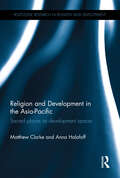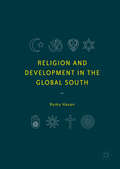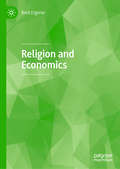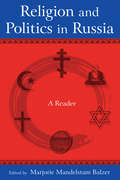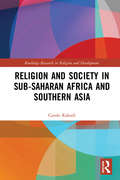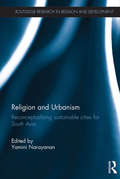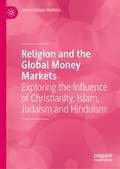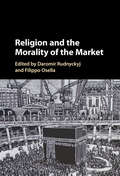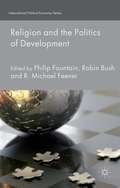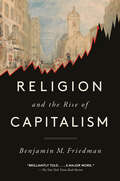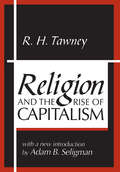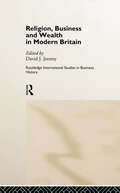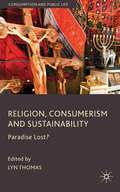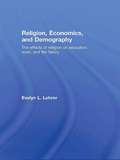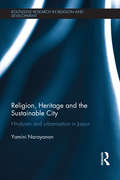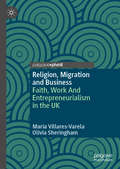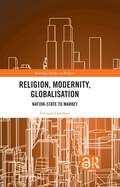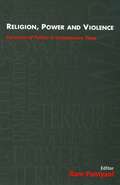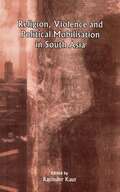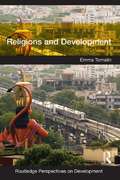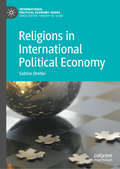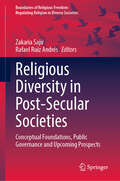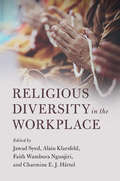- Table View
- List View
Religion and Development in the Asia-Pacific: Sacred places as development spaces (Routledge Research in Religion and Development)
by Matthew Clarke Anna HalafoffCommunity development is most effective and efficient when it is situated and led at the local level and considers the social behaviours, needs and worldviews of local communities. With more than eight out of ten people globally self-reporting religious belief, Religion and Development in the Asia-Pacific: Sacred places as development spaces argues that the role and impact of religions on community development needs to be better understood. It also calls for greater attention to be given to the role of sacred places as sites for development activities, and for a deeper appreciation of the way in which sacred stories and teachings inspire people to work for the benefit of others in particular locations. The book considers theories of ‘place’ as a component of successful development interventions and expands this analysis to consider the specific role that sacred places – buildings and social networks – have in planning, implementing and promoting sustainable development. A series of case studies examine various sacred places as sites for development activities. These case studies include Christian churches and disaster relief in Vanuatu; Muslim shrines and welfare provision in Pakistan; a women’s Buddhist monastery in Thailand advancing gender equity; a Jewish aid organisation providing language training to Muslim Women in Australia; and Hawaiian sacred sites located within a holistic retreat centre committed to ecological sustainability. Religion and Development in the Asia-Pacific demonstrates the important role that sacred spaces can play in development interventions, covering diverse major world religions, interfaith and spiritual contexts, and as such will be of considerable interest for postgraduate students and researchers in development studies, religious studies, sociology of religion and geography.
Religion and Development in the Global South
by Rumy HasanThis book examines how the beliefs and practices of each of the major world religions, as well as other belief systems, affect the variables that influence growth and development in the Global South. Evidence suggests that as countries develop, the influence of religion on all aspects of society declines. In stark contrast to the developed world, in the Global South, the role of religion is highly pervasive - the distinctive conclusion of this book is therefore that a lessening of religiosity is a sine qua non for growth and development, including secular laws and constitutions. Offering a ground-breaking study in an area little explored in the English language, this book will satisfy an important gap in the literature on the political economy of development, sociology of religion, law, and anthropology.
Religion and Economics
by Resit ErgenerThis book allows the reader to have an overview of the relations between religion and economics throughout history. It starts with the beginnings of early modern humans, when dreams (of dead ancestors), animism, synchronous movements and a propensity to exchange, led to the emergence of religion, which then contributed to the coordination and pooling of labor and to the definition of groups. This book surveys the various roles played by religion in economic life through the ages, which include the justification of the exploitation of nature, the expansion of trade, the emergence of inequality and of charity, the definition, enhancement and attenuation of hierarchies of dominance, the provision of various services and of the impact religion has had on economic performance at the micro and macro levels.
Religion and Politics in Russia: A Reader
by Marjorie Mandelstam BalzerRussia is not only vast, it is also culturally diverse, the core of an empire that spanned Eurasia. In addition to the majority Russian Orthodox and various other Christian groups, the Russian Federation includes large communities of Muslims, Jews, Buddhists, and members of other religious groups, some with ancient historical roots. All are in a state of ferment, and securing formal state recognition for specific communities is often daunting. This collection provides entry into the diversity of Russia's religious communities. Marjorie Mandelstam Balzer's introduction to the volume illuminates major political, social, and cultural-anthropological trends. The book is organized by religious tradition or identity, with further thematic perspectives on each set of readings. The authors include ethnologists, sociologists, political analysts, and religious leaders from many regions of the Federation. They analyze the changing dynamics of religion and politics within each community and in the context of the current drive to recentralize both political and religious authority in Moscow. Topical coverage extends from reassertions of Russian Orthodoxy to activities of Christian and Muslim missionaries to the revival of many other religions, including indigenous shamanic ones.
Religion and Society in Sub-Saharan Africa and Southern Asia (Routledge Research in Religion and Development)
by Carole RakodiThis book analyses how religion is entangled in people’s lives in Sub-Saharan Africa and southern Asia. It provides an introduction to the teachings, practices and values promoted by the main religious traditions in these regions and an overview of the evidence on what religion means to people in terms of their beliefs and religious practices and how it influences their values, attitudes and day-to-day relationships with others, especially their families. Over the course of the book Carole Rakodi explores similarities and differences between and within religious traditions and identifies some of the key factors that influence and explain the roles played by religion in people’s personal lives and social relationships. A separate companion volume will go on to focus on the social and political roles and relationships of religious groups and organisations. This book will be of great interest to academics and students working in a range of disciplines, especially sociology, religious studies and development studies but also anthropology, geography and area studies.
Religion and Urbanism: Reconceptualising sustainable cities for South Asia (Routledge Research in Religion and Development)
by Yamini NarayananConceptions of 'sustainable cities' in the pluralistic and multireligious urban settlements of developing nations need to develop out of local cultural, religious and historical contexts to be inclusive and accurately respond to the needs of the poor, ethnic and religious minorities, and women. Religion and Urbanism contributes to an expanded understanding of 'sustainable cities' in South Asia by demonstrating the multiple, and often conflicting ways in which religion enables or challenges socially equitable and ecologically sustainable urbanisation in the region. In particular, this collection focuses on two aspects that must inform the sustainable cities discourse in South Asia: the intersections of religion and urban heritage, and religion and various aspects of informality. This book makes a much-needed contribution to the nexus between religion and urban planning for researchers, postgraduate students and policy makers in Sustainable Development, Development Studies, Urban Studies, Religious Studies, Asian Studies, Heritage Studies and Urban and Religious Geography.
Religion and the Global Money Markets: Exploring the Influence of Christianity, Islam, Judaism and Hinduism
by James Simon WatkinsThis book focuses on how religion—particularly Christianity, Islam, Judaism, and, to a lesser extent, Hinduism—is shaping the ethos and daily actions of market participants within the global money markets. The concepts inherent within Christianity, Islam, Judaism, and Hinduism are making themselves felt within the global money markets. As Islamic finance led to the introduction of sharia compliant derivatives, for example, Christian investment funds are leading ethical initiatives on Wall Street, the City of London, and elsewhere such as divesting from fossil fuels in response to the climate change emergency. Jewish faith led funds are making significant strides with the further development of impact investments. The concept of Hindu economics is also beginning to shape the actions of some market participants which are tied to the ideals of Mahatma Gandhi.
Religion and the Morality of the Market
by Filippo Osella Daromir RudnyckyjSince the collapse of the Berlin Wall, there has been a widespread affirmation of economic ideologies that conceive the market as an autonomous sphere of human practice, holding that market principles should be applied to human action at large. In the wake of the 2008 financial crisis, the ascendance of market reason has been countered by calls for reforms of financial markets and for the consideration of moral values in economic practice. This book intervenes in these debates by showing how neoliberal market practices engender new forms of religiosity, and how religiosity shapes economic actions. It reveals how religious movements and organizations have reacted to the increasing prominence of market reason in unpredictable, and sometimes counterintuitive, ways. Using a range of examples from different countries and religious traditions, the book illustrates the myriad ways in which religious and market moralities are closely imbricated in diverse global contexts.
Religion and the Politics of Development
by R. Michael Feener Philip Fountain Robin BushEschewing tired doctrines of strict demarcation between development, religion and politics, this volume takes up the task of critically analysing this triple nexus. The chapters brought together in this landmark collection draw on detailed empirical studies from around contemporary Asia. Through their engagements with Islam, Christianity, Buddhism, and secularism, among other traditions, the chapters argue persuasively for a new research agenda that attends to the ways in which development,religion, and politics are dynamically interconnected. In doing so, they deploy innovative conceptual approaches that rework taken-for-granted frames.
Religion and the Rise of Capitalism
by Benjamin M. FriedmanFrom one of the nation's preeminent experts on economic policy, a major reassessment of the foundations of modern economic thinking that explores the profound influence of an until-now unrecognized force--religion.Critics of contemporary economics complain that belief in free markets--among economists as well as many ordinary citizens--is a form of religion. And, it turns out, that in a deeper, more historically grounded sense there is something to that idea. Contrary to the conventional historical view of economics as an entirely secular product of the Enlightenment, Benjamin M. Friedman demonstrates that religion exerted a powerful influence from the outset. Friedman makes clear how the foundational transition in thinking about what we now call economics, beginning in the eighteenth century, was decisively shaped by the hotly contended lines of religious thought within the English-speaking Protestant world. Beliefs about God-given human character, about the after-life, and about the purpose of our existence, were all under scrutiny in the world in which Adam Smith and his contemporaries lived. Friedman explores how those debates go far in explaining the puzzling behavior of so many of our fellow citizens whose views about economic policies--and whose voting behavior--seems sharply at odds with what would be to their own economic benefit. Illuminating the origins of the relationship between religious thinking and economic thinking, together with its ongoing consequences, Friedman provides invaluable insights into our current economic policy debates and demonstrates ways to shape more functional policies for all citizens.
Religion and the Rise of Capitalism (Peregrine Bks.)
by R.H. TawneyIn one of the truly great classics of twentieth-century political economy, R. H. Tawney addresses the question of how religion has affected social and economic practices. He does this by a relentless tracking of the influence of religious thought on capitalist economy and ideology since the Middle Ages. In so doing he sheds light on why Christianity continues to exert a unique role in the marketplace. In so doing, the book offers an incisive analysis of the historical background of present morals and mores in Western culture.Religion and the Rise of Capitalism is even more pertinent now than when it first was published; for today it is clearer that the dividing line between spheres of religion and secular business is shifting, that economic interests and ethical considerations are no longer safely locked in separate compartments. By examining that period which saw the transition from medieval to modern theories of social organization, Tawney clarifies the most pressing problems of the end of the century. In tough, muscular, richly varied prose, he tells an absorbing and meaningful story. And in his new introduction, which may well be a classic in its own right, Adam Seligman details Tawney's entire background, the current status of social science thought on these large issues, and a comparative analysis of Tawney with Max Weber that will at once delight and inform readers of all kinds.
Religion, Business and Wealth in Modern Britain (Routledge International Studies in Business History)
by David JeremyThe relationship of economics, capitalism and wealth to the ethics and morality of religion has intrigued and challenged policymakers, pressure groups, theologians, sociologists, economists and historians for centuries. Here David Jeremy addresses these questions in the context of modern Britain. His preliminary survey of historical controversies within religion and business, and the accompanying chronology of significant events since the 1770s are an extremely useful introduction for those unfamiliar with the field.
Religion, Consumerism and Sustainability
by Lyn ThomasThis collection analyses relationships between religious and consumption practices and cultures, and their diverse responses to ecological crisis, ranging from indifference to engagement.
Religion, Economics and Demography: The Effects of Religion on Education, Work, and the Family (Routledge Frontiers of Political Economy)
by Evelyn LehrerUsing the tools of economics, this book analyses how religion affects decisions and outcomes in a wide range of areas, including education, employment, family size, entry into cohabitation and formal marriage, the choice of spouse and divorce. In each case, the relationships are rigorously quantified based on multivariate statistical analyses of large scale US data. The results show, for example, that when people marry outside their faith, there is an increase in the probability of divorce, the magnitude of the adverse effect depending in part on the ecumenical/exclusivist nature of the two religions. Other analyses show that youth who grow up with some religion in their lives are less likely than their counterparts with little or no religious involvement to drop out of high school or enter cohabiting arrangements at a young age. Overall, both religious affiliation and the extent of participation in religious activities are found to have far-reaching implications for economic and demographic behaviour. The book contains a wealth of data illustrating how the religious and secular realms of people’s lives are intimately intertwined. With its economic perspective, it offers new ways of thinking about these relationships and is a valuable resource for students and scholars interested in the role of religion in education, work and the family.
Religion, Heritage and the Sustainable City: Hinduism and urbanisation in Jaipur (Routledge Research in Religion and Development)
by Yamini NarayananThe speed and scale of urbanisation in India is unprecedented almost anywhere in the world and has tremendous global implications. The religious influence on the urban experience has resonances for all aspects of urban sustainability in India and yet it remains a blind spot while articulating sustainable urban policy. This book explores the historical and on-going influence of religion on urban planning, design, space utilisation, urban identities and communities. It argues that the conceptual and empirical approaches to planning sustainable cities in India need to be developed out of analytical concepts that define local sense of place and identity. Examining how Hindu religious heritage, beliefs and religiously influenced planning practices have impacted on sustainable urbanisation development in Jaipur and Indian cities in general, the book identifies the challenges and opportunities that ritualistic and belief resources pose for sustainability. It focuses on three key aspects: spatial segregation and ghettoisation; gender-inclusive urban development; and the nexus between religion, nature and urban development. This cutting-edge book is one of the first case studies linking Hindu religion, heritage, urban development, women and the environment in a way that responds to the realities of Indian cities. It opens up discussion on the nexus of religion and development, drawing out insightful policy implications for the sustainable urban planning of many cities in India and elsewhere in South Asia and the developing world.
Religion, Migration and Business: Faith, Work And Entrepreneurialism in the UK (Religion and Global Migrations)
by Olivia Sheringham María Villares-VarelaThis book critically interrogates the role of religious faith in the experiences and practices of migrant entrepreneurs against the backdrop of neoliberal Britain. Focussing on Pentecostalism, a popular Christian denomination amongst migrant groups in the UK, the authors draw on primary qualitative data to examine the ways in which Pentecostal beliefs and values influence the aspirations and practices of migrant entrepreneurs. The book also explores the role of Pentecostal churches in supporting entrepreneurial activities among migrant communities, arguing that these institutions simultaneously comply and contest the formation of neoliberal subjectivities: providing cultural legitimacy to the entrepreneurial subject, whilst also contesting the community erosion of neoliberalism, (particularly in an austerity context) and fostering a strong a sense of belonging among congregants. The book offers an interdisciplinary perspective spanning sociology, geography and entrepreneurship studies to explain how values and faith networks shape everyday life, work and entrepreneurial practices.
Religion, Modernity, Globalisation: From Nation-State to Market (Routledge Studies in Religion)
by François GauthierThis book argues that the last four decades have seen profound and important changes in the nature and social location of religion, and that those changes are best understood when cast against the associated rise of consumerism and neoliberalism. These transformations are often misunderstood and underestimated, namely because the study of religion remains dependent on the secularisation paradigm which can no longer provide a sufficiently fruitful framework for analysis. The book challenges diagnoses of transience and fragmentation by proposing an alternative narrative and set of concepts for understanding the global religious landscape. The present situation is framed as the result of a shift from a National-Statist to a Global-Market regime of religion. Adopting a holistic perspective that breaks with the current specialisation tendencies, it charts the emergence of the State and the Market as institutions and ideas related to social order, as well as their changing rapports from classical modernity to today. Breaking with a tradition of Western-centeredness, the book offers probing enquiries into Indonesia and a synthesis of global and Western trends. This long-awaited book offers a bold new vision for the social scientific study of religion and will be of great interest to all scholars of the Sociology and Anthropology of religion, as well as Religious Studies in general.
Religion, Modernity, Globalisation: Nation-State to Market (Routledge Studies in Religion)
by François GauthierThis book argues that the last four decades have seen profound and important changes in the nature and social location of religion, and that those changes are best understood when cast against the associated rise of consumerism and neoliberalism. These transformations are often misunderstood and underestimated, namely because the study of religion remains dependent on the secularisation paradigm which can no longer provide a sufficiently fruitful framework for analysis.The book challenges diagnoses of transience and fragmentation by proposing an alternative narrative and set of concepts for understanding the global religious landscape. The present situation is framed as the result of a shift from a National-Statist to a Global-Market regime of religion. Adopting a holistic perspective that breaks with the current specialisation tendencies, it charts the emergence of the State and the Market as institutions and ideas related to social order, as well as their changing rapports from classical modernity to today. Breaking with a tradition of Western-centeredness, the book offers probing enquiries into Indonesia and a synthesis of global and Western trends.This long-awaited book offers a bold new vision for the social scientific study of religion and will be of great interest to all scholars of the Sociology and Anthropology of religion, as well as Religious Studies in general.The Open Access version of this book, available at http://www.taylorfrancis.com, has been made available under a Creative Commons-Attribution-Non Commercial-No Derivatives (CC BY-NC-ND) 4.0 license.
Religion, Power and Violence: Expression of Politics in Contemporary Times
by Ram PuniyaniThe rise of communalism in recent years as the major claimant to power in Indian politics has posed a serious challenge to the survival of democracy and is even threatening the fabric of the Constitution. Coupled with the fact that political discourse in the international arena has been increasingly using the language of religion, this phenomenon has posed a serious challenge to human rights movements worldwide. The seventeen original essays in this volume traverse a large canvas and critically interrogate Hindutva from multiple vantage points in the light of recent national and international political events.
Religion, Violence and Political Mobilisation in South Asia
by Ravinder KaurThis volume provide a multidisciplinary thematic exploration of religious violence in South Asia. The contributors examine the actual organization of violence, the role of governmental agencies and state authorities, the socio-economic conditions that contribute to violence, and the long-term consequences of such violence. Providing original ethnographic accounts from sites of violence in South Asia it: - map the contemporary discourse on Hindu-Muslim violence and focus on the causes of communal violence as well as its long-term consequences; - situate the nation-state within the incidents of violence-variously termed ethnic, communal and everyday violence - that simultaneously frame and challenge the authority of the state; - locate the current discussion on violence and the state in Pakistan, and provide a general thematic overview of religion and state institutions in Pakistan; - discuss the specific locality-based socio-economic conditions that contribute to violence; - expand various categories of violence to present a South Asian perspective in regard to the current western discourse on `global terrorism′.
Religions and Development (Routledge Perspectives on Development)
by Emma TomalinReligion has been excluded from development studies for decades. Religious traditions have contributed greatly towards development work, yet major international players have tended to ignore its role. Recent years have shown a noticeable shift in development policy, practice and research to recognize religion as a relevant factor. This text provides a comprehensive insight into different approaches towards the understanding the relationships between religions and development studies, policy and practice. It guides readers through current debates, presenting, explaining and critically evaluating a broad range of literature and locating it within a theoretical context. The text explores the role of religion within development, from positive contributions, such as the important role that many ‘faith-based organizations’ play in education or health care, to more complicated and contested notions of impact, such as religiously inspired violence or gender inequality. The book begins with three background chapters, outlining the relevance of religions for development studies, policy and practice, and introducing the reader to the study of ‘development’ and of ‘religions’. Following these, the focus then shifts to examine a number of thematic areas, including religion, gender and development, and the implications of the ‘rise of religion’ for mainstream development studies, policy and practice in the 21st century. Each chapter contains a range of features to assist undergraduate learning, including learning objectives for each chapter, discussion of key concepts, summaries, discussion questions, further reading and websites. The book also contains over sixty boxed case studies to provide further definition, explanation, and examples of the interactions between religions and development globally. This innovative text presents religions as something that can both obstruct and aid development, encouraging readers to engage critically with the multiple ways that religion impacts on both the conceptualization of development as well the resulting project interventions. This will be of interest to undergraduate, postgraduate students and scholars interested in religious studies, development studies, and the broader study of societies and cultures.
Religions in International Political Economy (International Political Economy Series)
by Sabine DreherThis book shows how religions and their internal struggles shape key actors and processes in the international political economy. It highlights how fundamentalist, business-oriented Christians in the United States were instrumental in the neoliberal turn in US hegemony, how Christianity, in the form of prosperity religion, transformed Latin America, and how reactionary religious movements sharpened state competition through illiberal politics in Turkey, India, and elsewhere. But reactionary movements are also confronted by liberationist or more progressive movements, such as Islamic feminism, that seek to build a more inclusive global economy. Religions and their ideas should be seen as a constitutive part of neoliberal globalization and its contestation in IPE.
Religious Diversity in Post-Secular Societies: Conceptual Foundations, Public Governance and Upcoming Prospects (Boundaries of Religious Freedom: Regulating Religion in Diverse Societies)
by Zakaria Sajir Rafael Ruiz AndrésThis book offers a multidisciplinary exploration of one of the defining characteristics of post-secular societies: religious diversity. Drawing from the sociology of religion, the sociology of migration, and related fields, it critically examines the interaction between religion, diversity, and secular governance, challenging conventional approaches to managing pluralism in contemporary contexts. Organized into three sections, the book explores: Theoretical and Conceptual Foundations: Establishing core frameworks for understanding post-secularization, pluralistic societies, and the intricate dynamics between religion and diversity. Regulating Religion in Postsecular and Diverse Societies: Analyzing policy innovation, comparative case studies, and practical challenges in managing religious diversity within secular governance structures. Navigating the Future: Prospects and Challenges of Diversity Governance in Post-Secular Contexts: Addressing emerging trends such as digital transformations, the politicization of religious identities, and the evolving role of religious traditions in fostering inclusivity and resilience. Featuring contributions from leading scholars and emerging researchers, this volume provides a multidimensional perspective on debates spanning sociology, anthropology, law, and public policy. Through socio-historical examples and case studies, it examines pressing topics such as religious pluralism in secular governance, diversity management strategies, and the transformative impact of digital technologies on religious expression. At its core, the book is framed by two key concepts: post-secularization and diversity. It reexamines religion&’s evolving role in secularized societies, taking religious plurality—not the disappearance of religion—as a starting point for exploring secularity. This work is an essential resource for students, researchers, educators, policymakers, and professionals seeking actionable insights into critical debates on religion, migration, diversity, and secular governance in today&’s globalized and digitalized world.
Religious Diversity in the Workplace
by Jawad Syed Alain Klarsfeld Härtel Charmine E. J. Faith Wambura NgunjiriEmployees bring their beliefs and religious values to work, and this can be a source of either positive performance or negative conflict. Social conflicts around religion impact more than societies and communities. They also impact organizations. 'Anti-religion' sentiments tend to be based on the perception that religion can be neatly separated from the 'more acceptable/palatable' spirituality, but this ignores the fact that - for most people - the two are intimately intertwined and inseparable. As religious identity is salient for a majority of the world's population, it is thus an important aspect of organizations - particularly those with a large and diverse body of employees. <P><P>This handbook provides a timely and necessary analysis of religious diversity in organizations, investigating the role of national context, the intersections of religion with ethnicity and gender, and approaches to diversity management.<P> The diverse team of editors and contributors ensures various viewpoints and a larger pool of arguments.<P> Explains the institutional, ideological, cultural, national, historical and demographic context and implications of religious diversity at work.<P> Emphasizes religion, in addition to the Anglo-American view of spirituality and faith, without treating religion as divisive.
Religious Doctrines and their Influence on Entrepreneurship
by James O. FietThis book explores how religious doctrines influence launching a new venture. It examines 16 Christian denominations and 9 world religions and how they would reasonably be expected to apply more than 20 distinct doctrines each to entrepreneurship. It is not an examination of doctrinal veracity because adherents have confidence in their beliefs. Rather, it examines how they will evaluate the attractiveness of entrepreneurship through the lenses of their beliefs, assuming they receive what they expect. More than 100 years ago, Max Weber pitted Protestantism against Hinduism in a single hypothesis. The current study is a multifactorial examination that covers the world’s major religions, as well as most of their doctrines. It is the first comprehensive examination of how entrepreneurs view the world through the lenses of their religious doctrines, which represent the formalization of their most deeply held beliefs.
